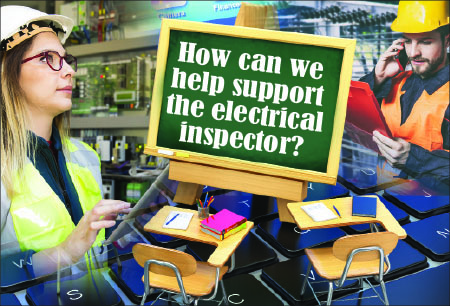I was recently reviewing IAEI’s Photovoltaic Power Systems for Inspectors, Plan Reviewers & PV Professionals based on the 2017 National Electrical Code. Author John Wiles is a recognized name in the solar industry who has written numerous articles for the IAEI magazine.
As I read through the book, a statement John made caught my attention.
“The challenge for every electrical inspector and plan reviewer is to keep abreast of these new developments as they start to appear in residential, commercial, and industrial electrical systems. The inspectors and the plan reviewers need to know as much, or more, about these new devices and systems as the people installing them. That has been true in the past and it needs to be the standard of performance in the future if the inspection community is to ensure the safety of the public.”
This statement not only applies to photovoltaic systems, but to any new emerging technology. I agree with John’s statement that inspectors and plans reviewers need to know as much or more about these systems as installers. They also need to understand how the Code is to be applied.
So, are inspectors and plans reviewers keeping up their skills to inspect these systems? If not, what are the barriers? What role does the authority having jurisdiction play in ensuring that inspectors and plans reviewers have the necessary skills so that proper inspection and review is carried out? What is the industry doing to help educate these workers and what training resources are currently available?
Let me provide a brief synopsis as to what I consider to be the key issues, and what the industry is doing to assist inspectors, plans reviewers, designers, and installers.
What we are seeing is that in many jurisdictions, inspectors and plans reviewers have limited time to perform inspections and to conduct plan reviews.
With tight budgets, many jurisdictions have moved towards multidiscipline, multi-hat or combination inspectors whereby inspectors are responsible for building, plumbing, mechanical and electrical. For new electrical inspectors starting out, combination inspectors that do not have an electrical background, or those that see limited types of specific installations such as PV, knowing the Code and how to apply it can be overwhelming. Inspectors and plans reviewers must be provided with adequate funding, resources and time for study and training to ensure they are both familiar and proficient with the Code and know how to apply it in the field.
The authority having jurisdiction should ensure that inspectors and plans reviewers have the necessary skills to carry out a proper inspection and plans review. First, they should confirm that the individual has the necessary qualifications, education, and skills to meet the requirements of the job when being hired. Secondly, the employer needs to provide the necessary resources and time for training, thus guaranteeing that inspectors and plan reviewers knowledge and skills are current with Code and new technologies. Thirdly, jurisdictions must schedule adequate time for employees to perform a thorough inspection for complex installations. The customer or client expectation is that the person performing the inspection or conducting a plans review is qualified and that the installation is inspected and complies with current code.
Also, the responsibility for training does not entirely lay with the authority having jurisdiction. Inspectors and plan reviewers need to take responsibility for their own personal development by ensuring that they stay current with industry trends, new technology, and updates on the current Code. They must also quickly inform their supervisor when additional training is required.
What is the industry doing to help educate electrical workers and what training resources are available?
There are a tremendous amount of resources available that can help educate inspectors, plans reviewers and installers. Both private and non-profit groups offer training in-house, online, through numerous publications, and by offering certification geared towards specific systems. Ensuring that the training, publications, and resources are taught and produced by recognized leaders and subject matter experts is vital.
At IAEI, we offer a wide variety of training and resource materials that include in-person training, online training, webinars, publications on varying topics, and an inspectors certification program. In addition, we have a partnership with Interstate Renewable Energy Council on an online course entitled Photovoltaic Online Training for Code Officials: http://cleanenergytraining.org/.
IAEI has also been working with National Fire Protection Agency (NFPA) on the development of two new standards on electrical inspections and electrical inspector professional qualifications. NFPA 78, Guide on Electrical Inspections, is designed to cover minimum criteria to aid in organizing and conducting electrical inspections, which includes administration, plans review, and field inspection. NFPA 1078, Standard for Electrical Inspector Professional Qualifications, specifies the minimum job performance requirements for serving as an electrical inspector.
To learn more about products and services offered by IAEI, visit www.iaei.org.
“If someone is going down the wrong road, he doesn’t need motivation to speed him up. What he needs is education to turn him around.” – Jim Rohn










Find Us on Socials